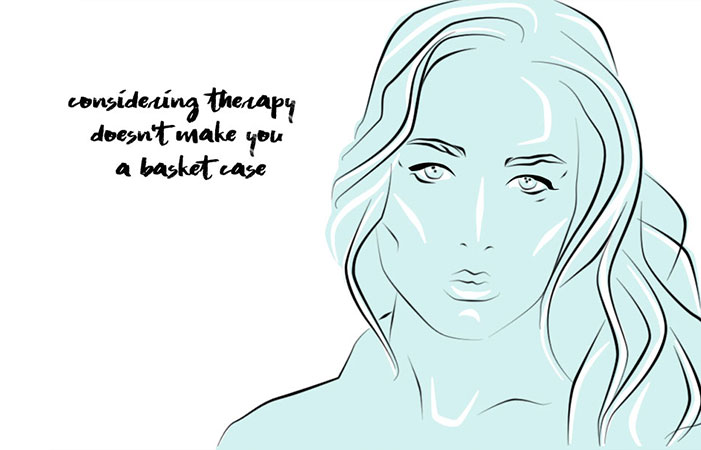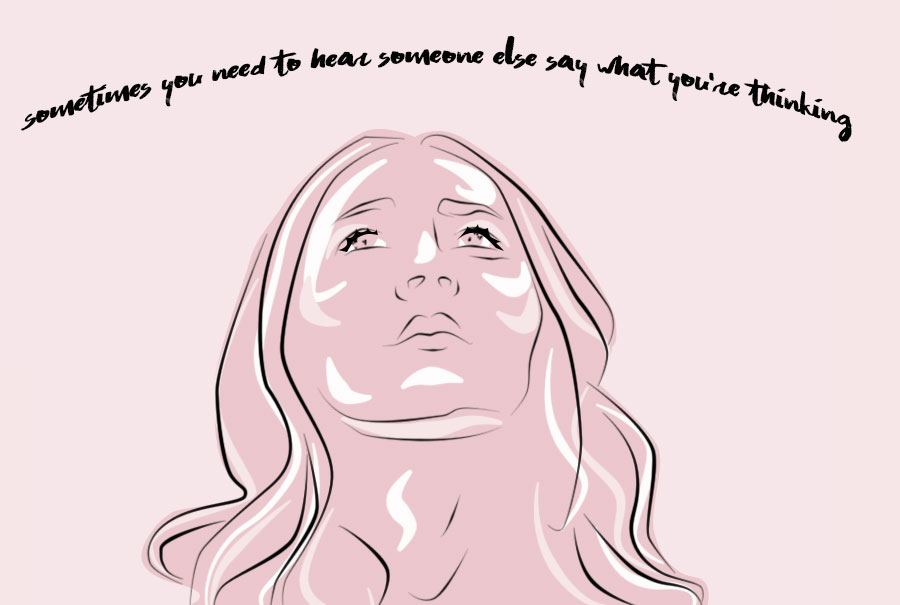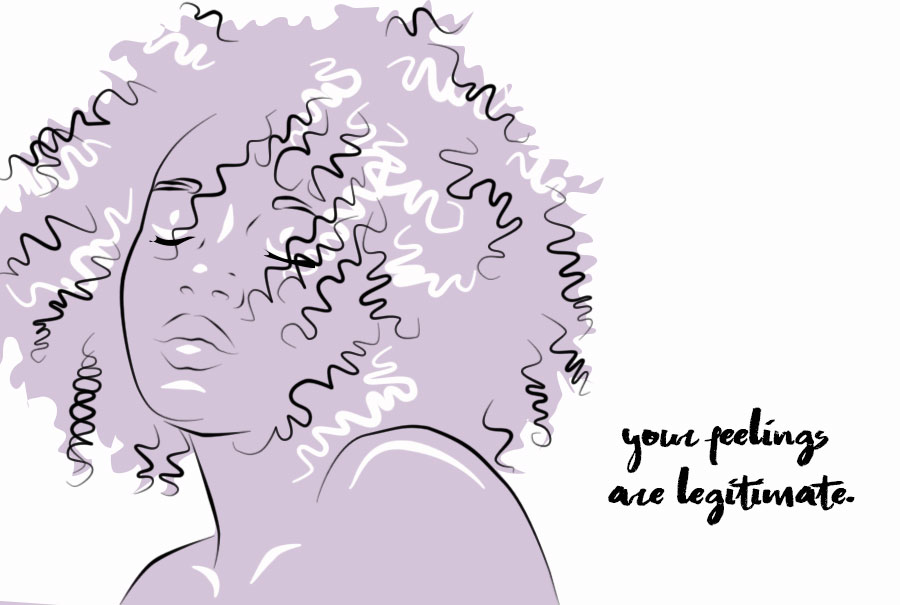5 Things I Learned In Therapy
 When I was younger, therapy seemed as strange and foreign a concept to me as insurance or no-carb diets. It was something that people joked about needing on TV or an activity for patients in asylums (now there’s a frightening concept to teach a child.) But when I started college, I discovered something I had never known much of before—free time to think. Upon entering the hallowed halls of university, a whole new world of confusing and sometimes painful feelings started to form in my suddenly-self-reflective brain. After attempting various unsuccessful methods of calming my now-frantic nerves and constant mood swings, I started to wonder if there wasn’t some better way to deal with my recently-acquired fluctuating personality traits. That’s about the time when I started looking into therapy as an option.
When I was younger, therapy seemed as strange and foreign a concept to me as insurance or no-carb diets. It was something that people joked about needing on TV or an activity for patients in asylums (now there’s a frightening concept to teach a child.) But when I started college, I discovered something I had never known much of before—free time to think. Upon entering the hallowed halls of university, a whole new world of confusing and sometimes painful feelings started to form in my suddenly-self-reflective brain. After attempting various unsuccessful methods of calming my now-frantic nerves and constant mood swings, I started to wonder if there wasn’t some better way to deal with my recently-acquired fluctuating personality traits. That’s about the time when I started looking into therapy as an option.
As someone who has gained quite a bit from her experience in therapy, I want to take a moment to debunk some myths and encourage those of you struggling with anxiety, depression, or bullying, or just generally feeling incapable of handling what life is throwing at you to really think about what you could gain from some time spent with a therapist.
Considering therapy doesn’t make you a basket case
Even if you’re interested in the idea of getting help in some form, the action of actually reaching out to a licensed psychologist or psychiatrist can bring up its own anxiety. A lot of people (including yours truly, before I started my sessions) worry that going to therapy makes you a certain kind of person. Perhaps you think that needing someone to talk to is weak, and you should be able to handle things on your own. Maybe you’re concerned about the stigma that could be attached to seeing a mental health professional. You can even feel stress over not knowing where to start, what to say, or if you can trust someone else with your inner-most thoughts. These feelings of trepidation are all totally normal. What’s important to remember is that, despite your doubts and fears, therapy is not a boogie monster to be afraid of. In fact, if you’re already thinking about asking for help, most likely the benefits of therapy will far outweigh any potential issues your brain can manufacture. A common root reason that many people are interested in therapy is to better understand and tackle their emotions, and that desire makes you anything but “crazy.”
Sometimes you need to hear someone else say what you’re thinking
You’re in your head all day. Just little ole you running around up there deciding what to say, picking what to eat, reminding yourself to breathe when your crush walks by—it’s a lot of pressure. And as the head honcho of your head, you develop certain patterns of thought to deal with the variety of situations you face each day, some that you may not even be fully aware of. These patterns can become entrenched ways of thinking of ourselves and of the world; and, often times, they can be very damaging and negative. Truths that you might accept as fact, like “If I don’t call myself ugly, how will I ever lose weight?” or “No one will ever love me. So, why bother?” play over and over in our heads when we’re feelings down. They’re our personal deprecation soundtracks—and we have all the lyrics memorized.

A good therapist won’t sit there and say, “You’re just the best! How could you not like you?” (which would not be helpful at all to someone deeply convinced of their own worthlessness). Instead, when you express something like the above statements, they’ll repeat them back to you. “So, you think that being cruel to yourself is the best way to motivate yourself into changing? Why do you think that?” Such questions can open up your mind to the origin and validity of your thought patterns. Has beating yourself up ever led to you feeling more beautiful or secure in yourself? It’s not likely. Whatever your self-judgments may be, hearing them aloud from someone else can help you reevaluate what you actually get from thinking about yourself a certain way.
Your feelings are legitimate.
If you grew up in an environment that encouraged stoicism over dramatic expressions of emotion, this can be bit confusing. Some people are used to stowing away uncomfortable things like anger, anxiety, sadness, and jealousy because they’re unpleasant to feel and can be considered “impolite” when burdened onto others. But, burying feelings deep down has its own set of repercussions. You may develop intense stress or unhealthy coping mechanisms to balance out your unexpressed instincts.
Having someone like a therapist who is there purely to listen can begin to alleviate some of this inner-tension and help you find your voice in times of struggle. Saying you are in pain isn’t a weakness. And if people around you don’t want to hear it, that isn’t your fault. I’m not saying you should go around lamenting to everyone you meet, but you should feel safe and secure when telling others natural sentiments. Learning to identify and point out how you’re feeling can be a big step on the way to being less overwhelmed by your own emotions.
There is a way to want to change, but you can also accept where you are right now
This was one of the most difficult concepts for me to grasp in therapy. How can you possibly want to be different than you are but also be understanding and kind to yourself as you are? My Vulcan brain did not compute. In my head, if I knew that I desperately wanted to be happier, thinner, more-boyfriend-adjacent, that meant that everything about me as I was must be entirely wrong. And conversely, if I learned to love myself as I was, then I would be giving up on ever improving and getting other things that I wanted. It’s a seductive mindset to fall into, and one that is constantly reinforced by pop culture (good lord, weight-loss contests?) and peer pressure to date.
But, here’s the thing. You can be happy (or happier) now. It’s not dependent on your weight or relationship status or college acceptance letters. You can get yourself so much closer to self-love by not stacking on that self-hate because you’re not that *special something else* that you need to be yet. You can have goals and dreams, but you can work towards achieving them while accepting who you are now. You can understand that things take time, that you don’t need to be perfect, and that faltering on the road to where you want to go is human and OKAY. I’m guessing that I haven’t convinced you. I wasn’t convinced when my therapist first posited this “theory” to me. But, next time you’re thinking about all the things you’re not, see if you can interrupt that train of thought. It’s a good first step.

Time. It honestly takes time.
A bit of bad news for the impatient (me again). Therapy isn’t an overnight cure. In fact, pretty much nothing is an overnight cure, so stop expecting that. Therapy teaches you about yourself and about how you interact with the world. It can teach you tactics for things like social anxiety or stress eating, but it should ultimately dig deeper into what causes the problems that you grapple with. And comprehending all the ways you have intertwined all the experiences of your life and produced your precise personality will take time. Loving yourself, forgiving others, learning about the pitfalls of life are massive undertakings. You will likely have to go through the darkest parts of yourself before you can start to untangle the mess and find some sign of the light. It’s worth it. It won’t be one realization or one day when everything clicks. But, over time, you will begin to see change in little things you do, and all those little shifts will begin to add up to a fresh perspective that is hopefully clearer and brighter.
Therapy isn’t for everyone and may not be the complete treatment for what you’re going through, but talking to someone can be a fantastic first step towards finding a way to live a life that brings you joy.
Have you gone to therapy, or thought about going? Are you a stoic, currently marooned on a high rock, busy convincing yourself you don’t need help?












